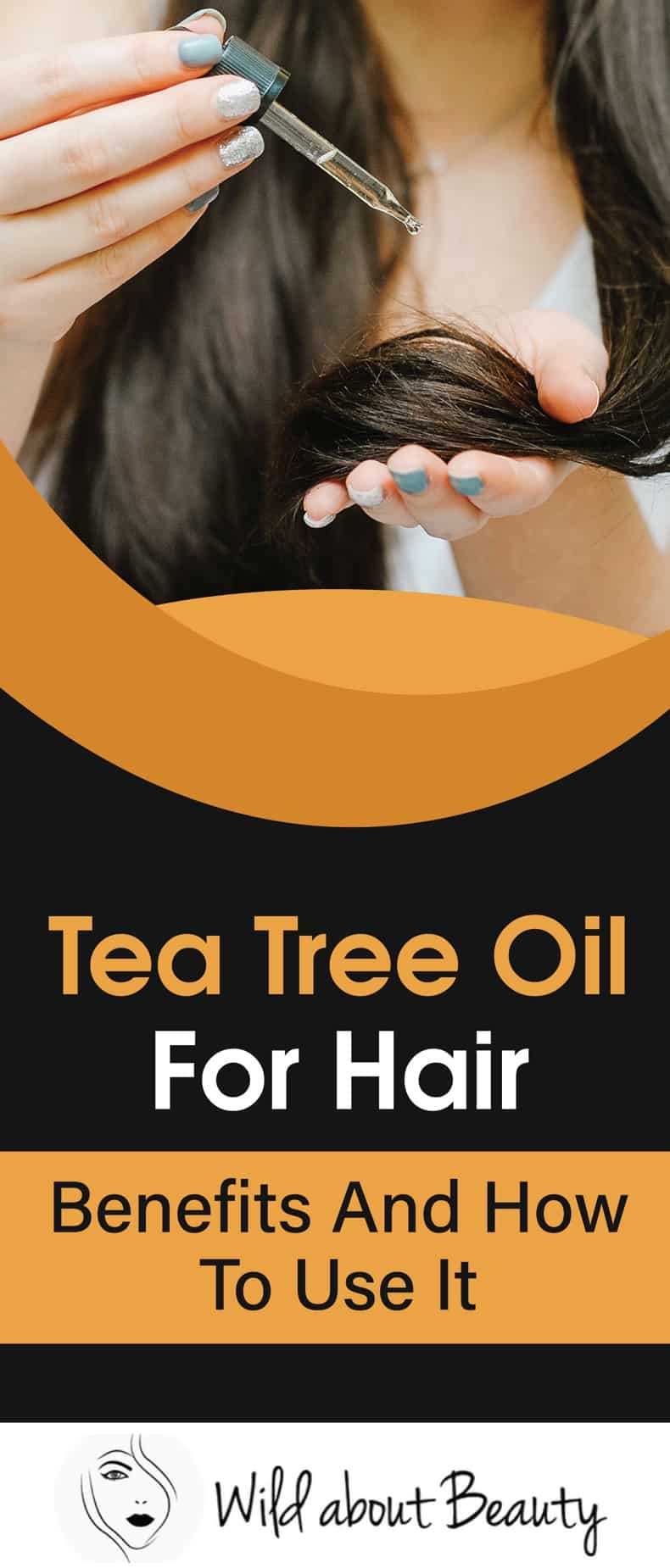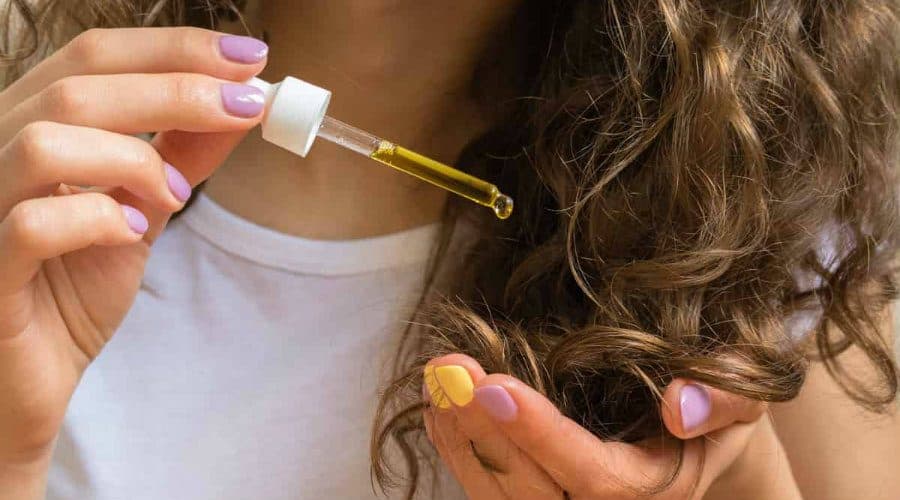Tea tree oil is an essential oil derived from the leaves of the tea tree.
The tree is native to Australia.
And same as other essential oils, tea tree oil has found its usage for medical benefits for hundreds of years.
For example, the aboriginal people of Australia used tea tree oil to clean wounds and treat infections.
Nowadays, one of the most popular usages is tea tree oil for hair.
Being a common ingredient in shampoos and soaps, we already know that tea tree oil is beneficial for our hair.
But exactly what are those benefits? And how to use it?
So far, studies have shown that the oil, and its antibacterial properties, make it beneficial for fighting off many viruses, fungi, and bacteria in your hair.
Our scalp skin is sensitive, and because of that, vulnerable to many skin conditions.
Dandruff and itchiness are usually caused by minor fungal infections.
And this is where tea tree oil comes in handy.
As an antifungal agent, it can effectively manage these conditions.
Chapter Overview
Why tea tree oil works?
As mentioned previously, most of the benefits of tea tree oil are derived from its antifungal, antibacterial, and antimicrobial properties.
Hair products nowadays contain a lot of harsh and severe chemicals.
And they strip your hair follicle of much-needed nutrients.
For example, if you use products often, or dye your hair often, you put it at risk of breaking off or falling out.
Just a small amount of tea tree oil will help prevent a buildup of chemicals and dead skin.
As a result, your skin looks healthy and moisturized.
This helps your hair grow at its normal rate.
In addition, it prevents your hair from falling out.
Dandruff, for example, is caused by an accumulation of scaly and dry skin in the scalp.
If left untreated, these dead skin cells hinder hair growth.
Shampoos containing tea tree oil will provide antibacterial and antifungal benefits, and help you get rid of dead skin on the scalp.
Benefits for hair

Tea tree oil for thicker hair
Tea tree oil will not directly speed up the hair growth process.
However, tea tree oil can encourage hair growth by unclogging hair follicles and nourish your roots.
When you suffer from dandruff or hair loss, the main reason for your hair not growing normally is clogged pores.
One study has shown that using shampoo with 5% concentration of tea tree oil over a one month period will result in a significant decline in dandruff, and significant improvement in hair growth.
The study explains how tea tree oil can help with growing thicker hair.
For starters, tea tree oil moisturizes your scalp, preventing dry and itchy scalp, and prevent dead skin cells buildup.
Tea tree oil also removes and prevents residue from hair products, allowing you to grow longer and more lustrous hair.
In the same time, tea tree oil controls excess oil production, another key ingredient in growing thicker hair.
There are a couple of ways how to use tea tree oil for thicker and longer hair.
The simplest is to massage the oil onto your scalp.
Dilute with a carrier oil, wash your hair regularly, and then massage the oil mixture onto the scalp.
Wrap with a towel, and allow it to stay there 10 minutes, so your hair can soak up the benefits.
Rinse out.
Repeat two or three times per week.
If you want even better results, use hot oils for this treatment, as hot oils penetrate even deeper into your hair.
Another option is to prepare a tea tree oil spray that you can apply to your hair and leave it in.
Fill a glass spray bottle with water, and then add 5 drops of tea tree oil per ounce of water.
Spray in the morning and leave it to stay throughout the day.
Tea tree oil beats dandruff
One of the most common usages of tea tree oil for your hair is to fight off and prevent dandruff.
Even if you are not experiencing hair loss, tea tree oil is beneficial.
Whenever you have a dandruff problem, look for a tea tree oil solution.
The oil will fight off fungus, bacteria, and viruses causing dandruff, and do so without drying your scalp.
Tea tree oil also serves as a natural conditioner and eliminates problems that lead your scalp to flake.
The best way to fight off dandruff with tea tree oil is to add it to your shampoo.
Add 10 drops per eight ounces of shampoo.
Wash your hair as normal, but allow your shampoo to sit for five minutes before rinsing out.
You can also apply as an overnight treatment.
Fill a small and empty bottle about three-quarters full with any carrier oil (jojoba, coconut, almond, or olive oil).
Then add 15 drops of tea tree oils.
Mix well.
Apply to your scalp and massage for several minutes.
Put a shower cap over your hair, and let the solution stay in overnight.
In the morning, rinse as usual.
Prevent itchy scalp
Some people suffer from an itchy scalp, which can be quite irritating.
In some cases, extreme itchiness can lead to hair loss.
Typically caused by fungus or bacteria, itchy scalp is something you want to get rid as soon as possible.
There are a couple of ways you can use tea tree oil to get rid of itchy scalp.
For example, you can make a coconut oil and a tea tree oil solution.
For this remedy, combine 10 drops of tea tree oil and 1 tablespoon of unrefined coconut oil.
Mix until the oils turn completely liquid and blend together.
Massage into your scalp, and focus on itchy areas.
Allow the mixture to sit for 30 minutes, or overnight.
Rinse well afterward, and then shampoo as usual.
Repeat once per week.
If you want a more potent recipe, try mixing peppermint oil, olive oil, and tea tree oil.
Being it is quite potent, you cannot and should not use it for more than once per week.
Combine three drops of peppermint and tea tree oil each, and one tablespoon of extra virgin olive oil.
Add all the ingredients to warm, but not scalding water.
Mix them well.
Shampoo your hair as normal and rinse afterward.
After that, massage the oils into the scalp, and allow them to penetrate for several minutes.
Rinse again.
You can use a mild shampoo afterward to get out the oils completely.
Get rid of head lice
Tea tree oil is very effective for getting rid of head lice.
Follow these instructions to eliminate lice.
Start by mixing 3 drops of tea tree oil, 3 drops of lavender oil, and 100 drops of mild shampoo.
Mix well, and then add a few drops of extra virgin olive oil to the mix.
Once the ingredients are blended, work the shampoo into your hair.
Massage into the scalp area.
Cover your hair with a shower cap, and allow the shampoo to work for 30 minutes.
After that, work into a lather, working it through the scalp and hair using your fingers to eliminate as many lice as possible.
Rinse with warm water. Work with a comb through your hair to remove all lice.
How to use tea tree oil for hair?
For those that have never tried tea tree oil before, the first thing you need to do is try a patch test.
This will show you whether you can use tea tree oil for hair or not.
A patch test will help you see if you have an allergic reaction to the oil or not.
To perform a patch test, place a few drops of the oil on a small patch of skin.
Watch for any signs of irritation or allergic reaction in the next 24 hours.
If there is no reaction, the oil is safe for use on your skin.
Next thing to pay attention to is that you should never apply tea tree oil before diluting it.
Mix your oil with any carrier oil, be it coconut oil, jojoba oil, almond oil, or olive oil.
If mixing with carrier oil makes the mixture hard to get out of your hair, try diluting tea tree oil with a substance such as apple cider vinegar or aloe vera.
The simplest way to use it is to add tea tree oil to your regular shampoo.
When mixing tea tree oil with a carrier oil, make sure to use only 5% concentration.
That translates to 5ml of tea tree oil with 100ml of carrier substance.
The same ratio applies when you are mixing oil with shampoo, or apple cider vinegar.
Risk and warnings
Generally speaking, tea tree oil is considered safe.
However, there are a few precautions you need to consider.
For starters, you cannot and should not ingest the oil.
If you ingest tea tree oil, you might cause loss of muscle control and balance.
The result could be a coma.
Tea tree oil is designed only for topical use.
And you should keep it out of reach of children.
When purchasing tea tree oil, always look for fresh products if your intention is to rub it on your hair.
Fresh tea tree oil is less likely to cause allergies than oxidized oil.
The oil contains 1.8-cineole, which is known to cause irritation on the skin on some people.
That is why it is best to perform a patch test before putting on your hair.
People with an allergic reaction to balsam of Peru, benzoin, colophony tinctures, eucalyptol, or plants from the myrtle family, have a greater risk of developing an allergic reaction to tea tree oil.
Side effects of using tea tree oil include depression, fatigue, muscle tremors, diarrhea, drowsiness, itching, and rashes.
Pregnant and breastfeeding women should avoid the oil, or use it with caution.
Always consult with your doctor if you are pregnant before using tea tree oil.
Tea tree oil will not help you if you have an autoimmune disorder, you go through chemotherapy, or have a genetic disposition to losing hair.
Tea tree oil will not help your hair loss associated with aging as well.

